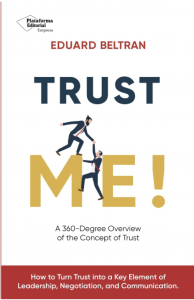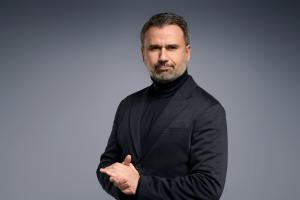Why Trust Will Define Leadership and Negotiation in 2026, Says International Advisor Eduard Beltran in ‘Trust Me!’
In his new book Trust Me!, international advisor Eduard Beltran explains why trust has become the strategic asset leaders must master to navigate 2026.
NEW YORK CITY, NY, UNITED STATES, November 26, 2025 /EINPresswire.com/ -- As global institutions confront rising geopolitical tension, digital acceleration and a crisis of public legitimacy, one factor is increasingly determining whether leaders will succeed or fail in 2026: trust. According to international advisor Eduard Beltran, trust has shifted from a moral ambition to the central operational mechanism that allows organisations to function, decide and negotiate. His new book, Trust Me!, offers a rigorous and practical framework for understanding trust as the strategic infrastructure of leadership in a fractured world.
For over two decades, Eduard Beltran has advised governments, multinational corporations, regulatory bodies and international organisations navigating high-stakes decision-making environments. His work spans national ministries managing institutional reforms, global companies undergoing cultural transformation, and cross-border negotiations where competing interests, asymmetry of information and uncertainty collide. This global exposure — from Europe to the Americas, the Middle East and Asia — has allowed Eduard Beltran to identify a pattern that transcends borders and sectors.
“What we are seeing across governance, business and civil society is not a simple leadership deficit,” Beltran writes.
“It is a systemic collapse of trust — the invisible architecture that holds decision-making together.”
Eduard Beltran argues that traditional leadership models were designed for stable environments where hierarchy conferred legitimacy, authority was rarely questioned and information flowed predictably. Today, these foundations have eroded. Teams, citizens and stakeholders demand coherence, transparency and behavioural alignment. When leaders fail to provide this — or when institutions show inconsistency — trust evaporates quickly and is increasingly difficult to rebuild.
2026: The Turning Point
In Trust Me!, Eduard Beltran identifies three structural shifts that will make 2026 a decisive year for leaders and institutions:
1. The Global Trust Recession
Across continents, public confidence in institutions — governments, companies, media, regulatory bodies — is falling simultaneously. This erosion affects everything from political stability to organisational cohesion. Eduard Beltran’s field observations reveal that when institutional trust collapses, individuals stop engaging, teams fragment, decisions slow, and negotiations become adversarial by default.
“Low-trust environments generate fear, opacity and defensive behaviour,” he notes.
“High-trust environments generate clarity, speed and cohesion. The difference in performance is exponential.”
2. Trust as Strategic Infrastructure
Eduard Beltran describes trust not as an abstract value but as “infrastructure”: the underlying system that enables coordinated action, intelligent problem-solving and resilient negotiation. Organisations with strong trust systems reduce transaction costs, accelerate execution and enhance collective intelligence. Those without them experience internal friction, conflict escalation and decision paralysis.
Examples drawn anonymously from Eduard Beltran’s advisory work illustrate the contrast:
A high-trust government negotiation that reached agreement in days rather than months.
A low-trust executive board that spent weeks debating minor issues due to fear of misalignment.
A multinational company that regained competitive advantage after re-establishing trust between its European and Asian leadership teams.
3. The Digital Trust Deficit
As organisations rely increasingly on remote work, virtual communication and AI-driven systems, leaders lose traditional relational cues that once built credibility: presence, tone, spontaneity and informal conversation. Trust must now be engineered through clarity, predictability and behavioural consistency, rather than proximity.
Eduard Beltran contends that leaders who underestimate this shift risk major disconnects with their teams and stakeholders.
“Digital environments amplify doubt when there is no clear architecture of trust,” he explains.
“Trust must be cultivated deliberately — not assumed.”
A Framework for Building and Restoring Trust
Trust Me! provides a structured, actionable framework that synthesises Beltran’s international field experience. Among the tools and principles included:
-The Trust Blueprint, outlining the four fundamentals of credible leadership: coherence, clarity, transparency and behavioural alignment.
-The Trust Restoration Protocol, offering practical steps to repair trust after conflict, organisational fatigue or crisis.
-The Negotiation Trust Index, helping leaders diagnose trust conditions in high-stakes negotiations and adapt strategy accordingly.
-The Digital Trust Rules, guiding leaders on how to communicate with precision in low-signal environments.
-The Trust Architecture Map, showing how institutions can redesign internal processes to rebuild legitimacy and influence.
Each concept is illustrated with real cases drawn from government negotiations, corporate transformations, regulatory dialogues and international mediation processes. Eduard Beltran reveals how small shifts in behaviour — a clearer decision rationale, a more predictable leadership cadence, transparent communication of constraints — can produce significant improvements in performance and cohesion.
Leadership in an Age of Complexity
Eduard Beltran argues that the uncertainty of 2026 will intensify the need for leaders who can build and sustain trust at scale. Economic pressures, political polarisation, rapid technological change and global interdependence will demand leadership that is both intellectually rigorous and relationally credible.
“The leaders who succeed in 2026 will not be defined by their technical expertise alone,” Beltran concludes.
“They will be defined by their ability to create the trust that enables intelligent decisions, constructive negotiation and institutional resilience. Trust is no longer a value — it is a competitive advantage.”
About Eduard Beltran
Eduard Beltran is an international advisor specialising in negotiation, leadership and institutional trust. Over the past 20 years, he has supported governments, major corporations and global organisations in high-stakes strategic environments. Known for bridging governmental, diplomatic and corporate perspectives, he provides leaders with a uniquely integrated understanding of influence, trust and decision-making in complex systems. Trust Me! is his latest work.
Olivia Evans
CEFNE
info@cefne.com
Legal Disclaimer:
EIN Presswire provides this news content "as is" without warranty of any kind. We do not accept any responsibility or liability for the accuracy, content, images, videos, licenses, completeness, legality, or reliability of the information contained in this article. If you have any complaints or copyright issues related to this article, kindly contact the author above.


